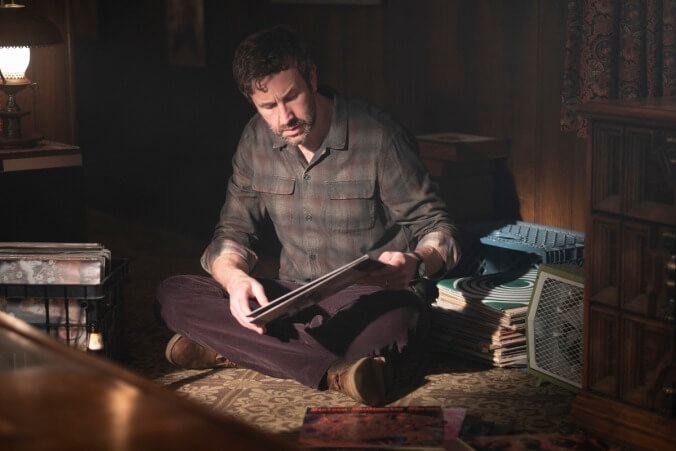Chris O’Dowd goes gun-crazy on an offbeat Twilight Zone


This week’s The Twilight Zone, “The Blue Scorpion,” is the second to be credited solely to writer Glen Morgan, who’s also an executive producer on this series—and who’s probably best-known to telephiles for being a regular contributor to The X-Files throughout its run. Perhaps that’s why both “The Blue Scorpion” and Morgan’s other solo credit this season, “A Traveler,” have such an X-Files vibe. They’re both about vast conspiracies and esoteric knowledge, and ordinary people drawn into strange, seemingly hopeless situations.
The poor bloke in “The Blue Scorpion” is sad-sack anthropology professor Jeff Storck, played by Chris O’Dowd. The son of an ex-hippie rock ’n’ roll bassist named Otis Storck—whose vintage Fender was played on-stage at both the legendary Monterey and Watkins Glen festivals—Jeff’s most pressing concern when the episode begins is keeping his wife Anne (Amy Landecker) from divorcing him. Then he comes home to find his dad dead on the floor from a self-inflicted gunshot wound. What Jeff doesn’t see, but we do, is that “OTIS” is inscribed on the spent bullet… before the name gradually fades away! (Cue Jordan Peele.)
Roughly the first 10 minutes or so of this well-paced 40-minute episode is spent with Jeff in shock, unable to process the police’s questions about his father’s mental state and his secret history of gun ownership. (“He basically shot himself in front of me,” he complains to a cop, who quickly points out that Otis had been dead for hours before Jeff came home. “I said basically,” Jeff counters.) He delivers a moving eulogy at the funeral, saying his dad “never got divorced, never went bankrupt, never went unloved.” But Jeff is also haunted by the note his father left, which reads, “I Love Him More Than You.”
At this point, it almost seems like this Twilight Zone might become a journey of self-reflection, via a mystery. Why did an old gun-hating lefty like Otis have a pistol? What else doesn’t Jeff know about his dad? Could investigating his own preconceived notions about his father save his own marriage?
But that’s not where Morgan and director Craig William Macneill (who previously worked on the indie horror film The Boy and the creepy anthology series Channel Zero) have chosen to steer this premise. Instead, as Jeff’s trying to find a way to unload this very nice-looking gun with a blue scorpion on the handle, he comes across another fancy inscribed bullet in his dad’s effects. This one reads: “JEFF.”
It gets weirder. The same day Jeff discovers the JEFF bullet, a gun-dealer tells him that the Blue Scorpion is incredibly rare (dating back to 1952 in Cuba), and that the legend among aficionados of armament is that, “You don’t find it, it finds you.” It’s a pistol with a purpose. The dealer also warns Jeff that the weapon doesn’t like to be kept in the dark.
So Jeff starts carrying it around with him everywhere, with a little flashlight to keep it company. He finds the presence of the gun oddly comforting He also starts wondering who JEFF is meant for. Maybe himself? Maybe Anne’s new boyfriend, also named Jeff? Maybe his wife’s attorney, who is also, ridiculously, named Jeff? Before long, our Jeff finds himself running into new Jeffs everyday. “It’s not right,” he says, shaking his head.
There’s a lot going on thematically in “The Blue Scorpion,” starting with the whole “too many Jeffs” business. The big point of the episode is that Americans in particular are too attached to guns as fetish-objects, valuing the continued existence of the weapons themselves over the people those weapons kill. The bottom line is that it doesn’t matter which Jeff has a date with JEFF. As soon as our Jeff comes into possession of a gun, it’s only a matter of time before he uses it. Someone’s gonna get JEFFed.
A perhaps more interesting sub-theme of this episode is that our overpowering attachment to objects extends beyond guns. A lot more of “The Blue Scorpion” than one might expect is spent on the Storcks’ divorce proceedings, during which Anne’s lawyer argues that it’s unfair of Jeff to hold onto items of sentimental value from Otis’ estate that could be liquidated for big money—like that historical Fender bass. Initially at least, his argument sounds outrageous.
On the other hand though, one of Jeff’s students confesses that she’s been obsessively anthropomorphizing her possessions, and that it’s becoming harder and harder for her to leave them alone in her room so she can come to class. This preoccupation with things, to the extent that it wrecks human endeavors, human relationships, human lives… It’s not so good. (At the end of one of the divorce meetings with Anne, Jeff makes an oblique reference to the Blue Scorpion, hissing at Anne that he loves it more than he ever loved her… echoing his dad’s last words.)
After all that rumination on ownership, “The Blue Scorpion” ends on one surprisingly up note, followed by one downer. Jeff finally does get to use JEFF, on a serial burglar—named Jeff, of course. He’s hailed as a hero, and named the new chair of his university’s anthropology department. He even ends his marriage with Anne, amicably (although her other Jeff does seem to be eyeing the two of them suspiciously at the end).
This is all followed by a coda—never a good thing on this new Twilight Zone—wherein two young boys out fishing find the Blue Scorpion, which Jeff had tossed into the lake. One of the boys is named Kyle. He finds a bullet… with “KYLE” inscribed on it! (Cue Jordan Peele, again.)
The coda is unnecessary. But this is still one of the better of the new Twilight Zones, thanks to Macneill’s assured direction, Morgan’s multifaceted script, and—most of all—thanks to O’Dowd’s compelling performance, as a man who thinks he’s losing everything, until he realizes that there’s always more to give up.
Stray observations
- What is it with Chris O’Dowd playing dudes in broken marriages? His character in Get Shorty is driven in part by his frustration and hurt feelings after his wife files for divorce. In the magnificent mini-miniseries State Of The Union, he plays a guy who meets up with his estranged wife in a pub once a week before their couples counseling session. Does no casting director out there think that Chris O’Dowd can maintain a relationship?
- The haunted/fateful object plot is a pretty common one for the old Twilight Zone. The episode most similar to this one from the Serling era is “The Encounter,” starring George Takei as a Japanese-American, who meets a man with a sword that bears a very strange inscription….